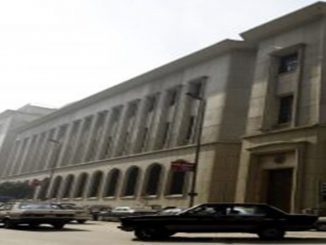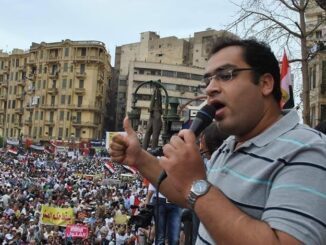
A boat carrying approximately 750 immigrants on board, many of them Egyptians, on June 14, sank off the coast of Greece
Only 104 people survived the shipwreck. Survivors recounted being held in horrific conditions in Libya before the journey and then experiencing shocking conditions on board.
A Greek court ordered nine Egyptian men into custody yesterday who were suspected crew members, while observers pointed at European Union (EU) policies and the Greek coast guard’s role in the latest tragedy in the Mediterranean.
Josep Borrell, the EU’s high representative for foreign policy, traveled to Cairo days after the shipwreck for talks in which migration figured prominently.
Borrell met with Minister of Defense Mohamed Zaki, Foreign Minister Sameh Shoukry and President Abdel Fattah al-Sisi. He pledged 80 million euros ($88 million) in European funding for Egypt’s border management, search and rescue, and anti-smuggling operations and stressed the need to “take fierce action against the smugglers and traffickers.”
He also announced 20 million euros ($22 million) in immediate assistance to support Egypt’s hosting of Sudanese refugees.
Borrell and his interlocutors celebrated what they described as ever-closer Egypt-EU cooperation in everything from migration, energy, security, and counterterrorism to regional issues including Ethiopia and Israel-Palestine.
“Also,” Borrell added vaguely, “in a positive manner, we have confirmed that we will go deeper in a political dialogue on human rights.”
Egypt’s economic situation
It is no secret how the Egyptian economic situation is extremely dire and in need for undertaking reforms.
With the review of Egypt’s structural reforms connected to its $3 billion International Monetary Fund (IMF) deal—necessary for the second $347 million tranche to come through—already three months late, IMF Managing Director Kristalina Georgieva yesterday voiced optimism tempered by caution.
In an interview with Asharq, Georgieva said that there are three areas in which Egypt requires reforms to enhance the competitiveness of its economy.
First, the state should “withdraw from activities that the public sector is not best suited to carry out” to make room for the private sector.
In its IMF deal, Egypt pledged to reduce the state’s economic footprint—including that of the military—but Georgieva made clear that it has failed to go far enough.
Relatedly, the government’s goal to raise $2 billion through sales of state assets by the end of this month appears increasingly out of reach.
The government appointed the World Bank Group’s International Finance Corporation as its “strategic advisor” for the privatization plan on June 18 in a bid to move the process along.
The second area for improvement cited by Georgieva is for Egypt to support its most vulnerable citizens and reduce benefits that go to wealthy citizens, while the third is to increase Egypt’s foreign currency reserves.
The government’s choice to continue using foreign reserves to prop up the pound instead of moving to a flexible exchange rate is like “putting water in a bucket that has holes,” Georgieva said.
Al-Sisi, however, recently ruled out another devaluation in the near future, saying it could “potentially hurt Egypt’s national security and crush Egyptians.”
With previous devaluations already hitting Egyptians’ purchasing power hard, the government announced a raise in the minimum private sector wage yesterday, the second hike in six months.
Georgieva said that the first review of the loan, originally set for March, should occur in September instead.
Repression ongoing
The Egyptian human rights situation is also dire, with about sixty political prisoners behind bars, according to human rights groups.
In this context, human rights defender and former National Council for Human Rights member Hoda Abdel Moneim has been transferred to a new prison but is still being denied visits, her family revealed last week, in one of several troubling updates from Egypt’s overflowing prisons.
“Today we were banned from visiting my wife, Hoda Abdel Moneim, following her transfer to the 10th of Ramadan prison,” her husband, human rights lawyer Khaled Badawy, wrote in a Facebook post.
“It has been three months and more since the last court session, and we know nothing about her situation. We are not even allowed to exchange letters to make sure she is fine.”
The Committee for Justice called on Egyptian authorities to disclose her whereabouts and to grant her release on medical grounds due to her deteriorating health condition.
Abdel Moneim was sentenced to five years in prison in March alongside dozens of other members of the Egyptian Coordination for Rights and Freedoms.
Meanwhile, April 6 Youth Movement co-founder Mohamed Adel on June 18 marked five years in pretrial detention.
He was arrested in 2018 as he was leaving the police station where he was forced to spend every night after completing an earlier three-and-a-half-year prison sentence.
Since then, he has been held under four different cases as a result of authorities’ efforts to circumvent the two-year legal maximum of pretrial detention. He was referred to trial in March but has yet to be tried.
The same day, a court renewed the detention of Sherif al-Rouby, a former April 6 Youth Movement spokesperson, for another 45 days on bogus terrorism charges.
Al-Rouby was released from two years of pretrial detention in May 2022 with the help of the Presidential Pardon Committee but re-arrested less than four months later.
According to the Egyptian Front for Human Rights’ latest count on June 12, since the Presidential Pardon Committee was relaunched in April 2022, 3,666 people have been arrested and investigated by the Supreme State Security Prosecution (SSSP)—compared to only 1,151 who have been released by a presidential pardon, the Public Prosecution, or terrorism circuit courts in that time.
The Egyptian Front also voiced concern that the SSSP—responsible for prosecuting crimes that relate to “state security”—is increasingly taking on economic cases after adding political accusations.
The move appears to be an effort by Egyptian authorities to “increase security control over issues affecting the crisis economic file in Egypt, which may threaten the popularity of the president, especially with the approaching presidential elections.”



